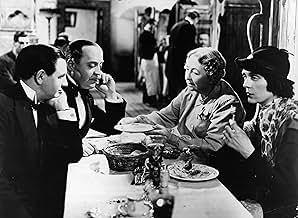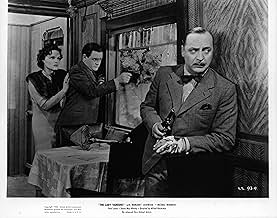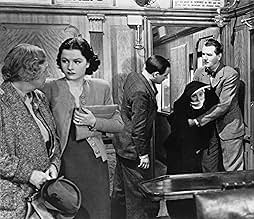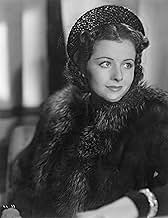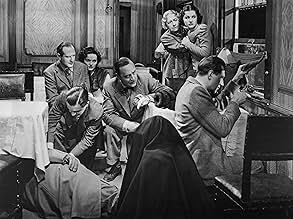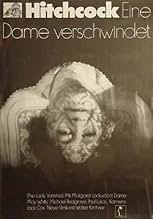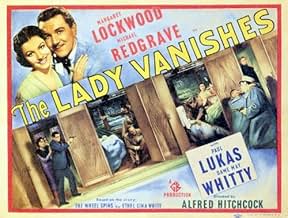NOTE IMDb
7,7/10
60 k
MA NOTE
Lors de son voyage en Europe continentale, une jeune femme riche se rend compte qu'une femme plus âgée semble avoir disparu du train.Lors de son voyage en Europe continentale, une jeune femme riche se rend compte qu'une femme plus âgée semble avoir disparu du train.Lors de son voyage en Europe continentale, une jeune femme riche se rend compte qu'une femme plus âgée semble avoir disparu du train.
- Réalisation
- Scénario
- Casting principal
- Récompenses
- 1 victoire et 1 nomination au total
May Whitty
- Miss Froy
- (as Dame May Whitty)
Selma Vaz Dias
- Signora Doppo
- (as Zelma Vas Dias)
Catherine Lacey
- The Nun
- (as Catherine Lacy)
Avis à la une
From 1938, The Lady Vanishes is clearly where Hitch was getting comfortable in his trade. Starting slowly, it soon revs up with mystery and intrigue. But I think that was the whole point. A seemingly innocuous day can lead itself into adventure.
Starting in some remote European village, a woman meets a little old lady. Getting on the train the next day, the old lady vanishes without a trace while she is asleep. When she asks about the lady, people say that there was no old lady. The mystery then ensues as our leading lady tries to uncover the plot behind a woman she knows was there.
The main aspect of this movie is the everyday humor that is applied. The two English fellows who are only looking for the latest cricket scores, score themselves some remarkable laughs. Our hero that comes to the leading woman's assistance is funny and charming himself. The time spent at the beginning in the hotel may seem to be off topic, making a viewer wonder where the mystery is, but the point is that the viewer becomes acquainted with the characters and are much more believable to the viewer. Again, I think Hitch was showing us our next door neighbors and how they can rise up against unusually dangerous circumstances. I think my analysis of Hitch would be his championing the moral fiber of everyman. I think that is why Hitchcock films still stand today as some of the best ever made.
This movie receives my major recommendation. Not done yet. I got more to view and review. What fun!
Starting in some remote European village, a woman meets a little old lady. Getting on the train the next day, the old lady vanishes without a trace while she is asleep. When she asks about the lady, people say that there was no old lady. The mystery then ensues as our leading lady tries to uncover the plot behind a woman she knows was there.
The main aspect of this movie is the everyday humor that is applied. The two English fellows who are only looking for the latest cricket scores, score themselves some remarkable laughs. Our hero that comes to the leading woman's assistance is funny and charming himself. The time spent at the beginning in the hotel may seem to be off topic, making a viewer wonder where the mystery is, but the point is that the viewer becomes acquainted with the characters and are much more believable to the viewer. Again, I think Hitch was showing us our next door neighbors and how they can rise up against unusually dangerous circumstances. I think my analysis of Hitch would be his championing the moral fiber of everyman. I think that is why Hitchcock films still stand today as some of the best ever made.
This movie receives my major recommendation. Not done yet. I got more to view and review. What fun!
"The Lady Vanishes" is one of Director Alfred Hitchcock's best British made films, in fact I think it's one of his all time best.
Set in pre-WWII somewhere in Europe, A group of people board a train bound for England after having spent the previous night in an overcrowded hotel. Iris Henderson (Margaret Lockwood) befriends a kindly old governess/teacher, Miss Froy (Dame May Witty). When Iris is struck by a falling flowerpot, Miss Froy promises to take care of her as they board the train.
After having tea together, the two women return to their compartment where Iris falls asleep. When she awakes, Miss Froy is gone, totally vanished. The people sharing the compartment, "The Baroness" (Mary Clare), Signor and Signora Doppo (Philip Leaver, Selma Van Dias) deny ever having seen Miss Froy. Doctor Hartz (Paul Lukas) comes to her aid and is convinced that the bump Iris received to her head may have caused a memory lapse.
Iris then meets Gilbert Redman (Michael Redgrave) whom she had met the previous evening at the hotel. He offers his help. Skeptical at first, he soon comes to believe Iris' story. Eric Todhunter (Cecil Parker) and "Mrs." Todhunter (Linden Travers) deny seeing Miss Froy because they are in the midst of an extra marital affair. Two British "gentlemen", Caldicott (Naughton Wayne) and Charters (Basil Radford) though having seen Miss Froy with Iris, don't wish to become involved.
When Dr. Hartz brings a patient aboard the train, Gilbert and Iris become suspicious and.......................................
As was his custom, Hitchcock pits his heroine against all odds in her quest to find Miss Froy. The suspense builds as the situation becomes more hopeless. This would be a theme that the master of suspense would use throughout his career. He also liked to work trains into many of his plots, including this film of which three quarters takes place on board a train.
The scene in the hotel showing Caldicott and Charters sharing a bed (and a pair of pajamas) never would have gotten by the American censors. The relationship between the Todhunters as well, was quite obvious and rare for the American cinema of the day.
This is one of Hitchcock's best films and hasn't suffered because of age. Highly recommended.
Set in pre-WWII somewhere in Europe, A group of people board a train bound for England after having spent the previous night in an overcrowded hotel. Iris Henderson (Margaret Lockwood) befriends a kindly old governess/teacher, Miss Froy (Dame May Witty). When Iris is struck by a falling flowerpot, Miss Froy promises to take care of her as they board the train.
After having tea together, the two women return to their compartment where Iris falls asleep. When she awakes, Miss Froy is gone, totally vanished. The people sharing the compartment, "The Baroness" (Mary Clare), Signor and Signora Doppo (Philip Leaver, Selma Van Dias) deny ever having seen Miss Froy. Doctor Hartz (Paul Lukas) comes to her aid and is convinced that the bump Iris received to her head may have caused a memory lapse.
Iris then meets Gilbert Redman (Michael Redgrave) whom she had met the previous evening at the hotel. He offers his help. Skeptical at first, he soon comes to believe Iris' story. Eric Todhunter (Cecil Parker) and "Mrs." Todhunter (Linden Travers) deny seeing Miss Froy because they are in the midst of an extra marital affair. Two British "gentlemen", Caldicott (Naughton Wayne) and Charters (Basil Radford) though having seen Miss Froy with Iris, don't wish to become involved.
When Dr. Hartz brings a patient aboard the train, Gilbert and Iris become suspicious and.......................................
As was his custom, Hitchcock pits his heroine against all odds in her quest to find Miss Froy. The suspense builds as the situation becomes more hopeless. This would be a theme that the master of suspense would use throughout his career. He also liked to work trains into many of his plots, including this film of which three quarters takes place on board a train.
The scene in the hotel showing Caldicott and Charters sharing a bed (and a pair of pajamas) never would have gotten by the American censors. The relationship between the Todhunters as well, was quite obvious and rare for the American cinema of the day.
This is one of Hitchcock's best films and hasn't suffered because of age. Highly recommended.
Alfred Hitchcock was noted for his light comic touch, but history records only one attempt at a full-out comedy, 1955's "The Trouble With Harry." The real trouble with "Harry" is it's not funny, but fortunately Hitchcock did leave us with a much surer and defter comedy in the guise of a thriller. Enter "The Lady Vanishes."
The opening scene gets a lot of hackles from people, as we find ourselves in a mountain valley where, after the credits roll, the camera glides over what is obviously a miniature train set. We even see a toy roadster glide by as the camera closes on the exterior of a model house.
Why, it's so primitive and fake! exclaim viewers accustomed to "Matrix"-style FX.
But they miss the point, and not just because they fail to take account of the time when the film was made. Here's what I think: Hitchcock shot the scene with a deliberate nod at the hokeyness of it, reminding his audience from the start that this is not the real thing but play-acting, to be taken as such. He knows it looks a bit phony (though the arresting pan-and-zoom would be the sort of opening other directors would imitate as soon as the technology let them). The focus of "The Lady Vanishes" is not politics, or even mystery. It is fun, in the same non-critical way as a child's entertainment. In this, Hitchcock succeeds, and creates no mere time capsule but a vessel of entertainment that has withstood decades of changing fashion, because it is first, last, and always fun.
"The Lady Vanishes" is the sort of film that works on pace, craft, and charm. The plot is well thought-out, provided you yourself try not to think about it much. There's really no reason for the story to go down the way it does, and once the movie is over, you begin to see the holes. Why is it necessary for British intelligence to go through so much trouble for info that could be just as easily delivered by telegram, or diplomatic pouch? Why, if you cold-bloodedly swipe a woman from a train, do you leave a witness behind to blurt out that there's been a disappearance? How come a name written on the inside of a train compartment window is erased by a blast of locomotive smoke across the outside of the window? But the engaging plot does what it is supposed to, keeping you interested and wondering what will happen next, rather than why it is happening the way it is.
The storyline of "The Lady Vanishes" is unlike any Hitchcock film. It's so light and airy that it reminds me more of a Tintin comic book, with the mythical Slavic nation of Vandreka the sort of simultaneously quaint and suspicious setting Herge would stick Captain Haddock and the Thompson Twins. Leave aside your sophisticated Dashiell Hammett-fed expectations for a moment. If you let yourself go, you will be transported, and quite entertained. Hitchcock never meshed comedy so thoroughly in the body of a story as he does here. Even "North By Northwest" has its serious spots, but "The Lady Vanishes" features a tense fight in a baggage car that's right out of Abbott & Costello and a climactic shootout that pauses for jokes between Caldicott and Charters, the cricket-mad pair who are a non-stop font of humor.
Margaret Lockwood is an effective plot vehicle as doughty Iris, who refuses to believe a knock on the head made her imagine the presence of the title character, Miss Froy. Michael Redgrave (Vanessa's pop) is a revelation as Gilbert, the folk-music scholar who half-humors, half-believes her strange tale until a stray scrap of trash converts him to her cause. He has a wonderful Errol Flynn-like quality, with his toothbrush mustache and his way with a quip.
Speaking of quips, the dialogue in this movie sparkles throughout, as when the barrister tells his mistress "The law, like Caesar's wife, must be above reproach," and she replies "Even when the law just spent six weeks with Caesar's wife?" Or when Iris asks how she was supposed to have replaced Miss Froy's face with that of the sinister Madame Kummer, and Gilbert replies: "Any change would be an improvement."
Interesting also for the opening, which ambles on for about 20 minutes before it starts to go anywhere, establishing the characters and the comic tone without offering a whiff of what the mystery might be. The close, too, with villains who seem oddly detached once the story is resolved ('Jolly good luck to them,' Paul Lukas observes enigmatically.) But that's for film scholars to muse over.
Hitchcock was never as agreeable a companion as he was here. And few films will put the kind of smile on your face like 'The Lady Vanishes,' no matter how long ago it was made.
The opening scene gets a lot of hackles from people, as we find ourselves in a mountain valley where, after the credits roll, the camera glides over what is obviously a miniature train set. We even see a toy roadster glide by as the camera closes on the exterior of a model house.
Why, it's so primitive and fake! exclaim viewers accustomed to "Matrix"-style FX.
But they miss the point, and not just because they fail to take account of the time when the film was made. Here's what I think: Hitchcock shot the scene with a deliberate nod at the hokeyness of it, reminding his audience from the start that this is not the real thing but play-acting, to be taken as such. He knows it looks a bit phony (though the arresting pan-and-zoom would be the sort of opening other directors would imitate as soon as the technology let them). The focus of "The Lady Vanishes" is not politics, or even mystery. It is fun, in the same non-critical way as a child's entertainment. In this, Hitchcock succeeds, and creates no mere time capsule but a vessel of entertainment that has withstood decades of changing fashion, because it is first, last, and always fun.
"The Lady Vanishes" is the sort of film that works on pace, craft, and charm. The plot is well thought-out, provided you yourself try not to think about it much. There's really no reason for the story to go down the way it does, and once the movie is over, you begin to see the holes. Why is it necessary for British intelligence to go through so much trouble for info that could be just as easily delivered by telegram, or diplomatic pouch? Why, if you cold-bloodedly swipe a woman from a train, do you leave a witness behind to blurt out that there's been a disappearance? How come a name written on the inside of a train compartment window is erased by a blast of locomotive smoke across the outside of the window? But the engaging plot does what it is supposed to, keeping you interested and wondering what will happen next, rather than why it is happening the way it is.
The storyline of "The Lady Vanishes" is unlike any Hitchcock film. It's so light and airy that it reminds me more of a Tintin comic book, with the mythical Slavic nation of Vandreka the sort of simultaneously quaint and suspicious setting Herge would stick Captain Haddock and the Thompson Twins. Leave aside your sophisticated Dashiell Hammett-fed expectations for a moment. If you let yourself go, you will be transported, and quite entertained. Hitchcock never meshed comedy so thoroughly in the body of a story as he does here. Even "North By Northwest" has its serious spots, but "The Lady Vanishes" features a tense fight in a baggage car that's right out of Abbott & Costello and a climactic shootout that pauses for jokes between Caldicott and Charters, the cricket-mad pair who are a non-stop font of humor.
Margaret Lockwood is an effective plot vehicle as doughty Iris, who refuses to believe a knock on the head made her imagine the presence of the title character, Miss Froy. Michael Redgrave (Vanessa's pop) is a revelation as Gilbert, the folk-music scholar who half-humors, half-believes her strange tale until a stray scrap of trash converts him to her cause. He has a wonderful Errol Flynn-like quality, with his toothbrush mustache and his way with a quip.
Speaking of quips, the dialogue in this movie sparkles throughout, as when the barrister tells his mistress "The law, like Caesar's wife, must be above reproach," and she replies "Even when the law just spent six weeks with Caesar's wife?" Or when Iris asks how she was supposed to have replaced Miss Froy's face with that of the sinister Madame Kummer, and Gilbert replies: "Any change would be an improvement."
Interesting also for the opening, which ambles on for about 20 minutes before it starts to go anywhere, establishing the characters and the comic tone without offering a whiff of what the mystery might be. The close, too, with villains who seem oddly detached once the story is resolved ('Jolly good luck to them,' Paul Lukas observes enigmatically.) But that's for film scholars to muse over.
Hitchcock was never as agreeable a companion as he was here. And few films will put the kind of smile on your face like 'The Lady Vanishes,' no matter how long ago it was made.
Although Hitchcock was noted for his wit and often sprinkled his films with wickedly funny moments, he seldom gave comic elements such a free reign as he did in THE LADY VANISHES, which is among the most memorable of his early British films. Charmingly cast with Margaret Lockwood, Michael Redgrave, and Dame May Witty in the leads, the extremely witty script mixes 1930s romantic froth with increasingly tense suspense in the story of sharp witted young woman (Lockwood) who befriends an elderly lady (Witty) during a train journey--and is extremely disturbed when, as the title states, the lady vanishes.
Many regard this as the best of Hitchcock's early work, and it is easy to see why: the film demonstrates his growing talent for building suspense from an unlikely mix of the commonplace and the incredible. He is also remarkably blessed in his cast, with Lockwood and Redgrave possessing considerable chemistry and Dame May Witty particularly endearing in one of the character roles at which she so excelled; the supporting cast is also particularly memorable.
Hitchcock guides them all with never a misstep through a complex script that progresses from very lighthearted to extremely sinister and then back again, and the result leaves audiences with both the satisfaction of a well-made thriller and the glow of a romantic comedy. Although it lacks the subtle tones of his later work, THE LADY VANISHES is among my own favorites by Hitchcock, and fans who have never seen it are in for a real treat. Highly recommended.
Gary F. Taylor, aka GFT, Amazon Reviewer
Many regard this as the best of Hitchcock's early work, and it is easy to see why: the film demonstrates his growing talent for building suspense from an unlikely mix of the commonplace and the incredible. He is also remarkably blessed in his cast, with Lockwood and Redgrave possessing considerable chemistry and Dame May Witty particularly endearing in one of the character roles at which she so excelled; the supporting cast is also particularly memorable.
Hitchcock guides them all with never a misstep through a complex script that progresses from very lighthearted to extremely sinister and then back again, and the result leaves audiences with both the satisfaction of a well-made thriller and the glow of a romantic comedy. Although it lacks the subtle tones of his later work, THE LADY VANISHES is among my own favorites by Hitchcock, and fans who have never seen it are in for a real treat. Highly recommended.
Gary F. Taylor, aka GFT, Amazon Reviewer
"Well, anyway, I refuse to be discouraged. Faint heart never found old lady."
Ah, this was a great movie! One of Hitch's best, and certainly one of his most entertaining. It was funny, thrilling, and just plain old fun to watch.
The story is quite simple. A sweet old lady disappears on a train, and the only person who admits ever seeing her, is a young woman who met her the night before. As she searches for the old lady, she's helped by a roguish young man, and they soon begin to wonder just who this lady is, where she went, and why on earth would so many people go through so much trouble to make it seem like she never existed. It all makes for a very compelling mystery.
The Lady Vanishes features some of the best characters I've ever seen in a Hitchcock film. Margaret Lockwood and Michael Redgrave were great as the two main protagonists, and the witty banter between the two was equaled only by the two dry, cricket-obsessed Englishmen who provided so much of the humor of the film. I found this movie to be similar to Rear Window (no wonder I enjoyed it so much), as there are many subplots among the minor characters that are almost as interesting as the main story.
I firmly believe that this is the best I've seen of Hitchcock's early movies. It has everything from shootouts to nuns in high heels. The Lady Vanishes will convert you to being a fan of Alfred, if you're somehow (drugs?) not already.
Ah, this was a great movie! One of Hitch's best, and certainly one of his most entertaining. It was funny, thrilling, and just plain old fun to watch.
The story is quite simple. A sweet old lady disappears on a train, and the only person who admits ever seeing her, is a young woman who met her the night before. As she searches for the old lady, she's helped by a roguish young man, and they soon begin to wonder just who this lady is, where she went, and why on earth would so many people go through so much trouble to make it seem like she never existed. It all makes for a very compelling mystery.
The Lady Vanishes features some of the best characters I've ever seen in a Hitchcock film. Margaret Lockwood and Michael Redgrave were great as the two main protagonists, and the witty banter between the two was equaled only by the two dry, cricket-obsessed Englishmen who provided so much of the humor of the film. I found this movie to be similar to Rear Window (no wonder I enjoyed it so much), as there are many subplots among the minor characters that are almost as interesting as the main story.
I firmly believe that this is the best I've seen of Hitchcock's early movies. It has everything from shootouts to nuns in high heels. The Lady Vanishes will convert you to being a fan of Alfred, if you're somehow (drugs?) not already.
Le saviez-vous
- AnecdotesIn order to get a realistic effect, Sir Alfred Hitchcock insisted that there should be no background music except at the beginning and the end. Between those two points, the only music heard is the music sung by the musician outside the hotel, the music tune of Miss Froy, the "Colonel Bogey March" music hummed by Gilbert (Michael Redgrave), the dance music conducted by Gilbert in his hotel room, and the dance music when Iris (Margaret Lockwood) meets Gilbert in the train.
- GaffesIn the noisy dancing scene above Lockwood's hotel room, the clarinet is shown with the mouthpiece turned with the reed upwards. Normally the mouthpiece is turned so that the reed is downwards, but in some European folk traditions the clarinet was played with the mouthpiece "upside-down".
- Citations
Gilbert: Can I help?
Iris Henderson: Only by going away.
Gilbert: No, no, no, no. My father always taught me, never desert a lady in trouble. He even carried that as far as marrying Mother.
- Crédits fousClosing credits: The Characters in "THE LADY VANISHES" were played by:
- Versions alternativesA brief segment where a hotel maid bends down to pick up a hat from under a hotel bed is missing from most US releases, including Criterion's first official DVD and all bootlegs. It's intact in all official non-US releases and has been restored for Criterion's 2-disc remastered DVD.
- ConnexionsEdited from Oh, Mr. Porter! (1937)
Meilleurs choix
Connectez-vous pour évaluer et suivre la liste de favoris afin de recevoir des recommandations personnalisées
Détails
- Date de sortie
- Pays d’origine
- Site officiel
- Langues
- Aussi connu sous le nom de
- La dama desaparece
- Lieux de tournage
- Société de production
- Voir plus de crédits d'entreprise sur IMDbPro
Box-office
- Montant brut mondial
- 41 493 $US
- Durée1 heure 36 minutes
- Couleur
- Rapport de forme
- 1.37 : 1
Contribuer à cette page
Suggérer une modification ou ajouter du contenu manquant

Lacune principale
By what name was Une femme disparaît (1938) officially released in India in English?
Répondre

